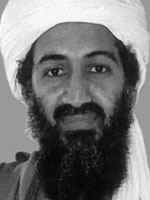 Continuing the analysis of the 9/11/01 terrorist attack on America....
Continuing the analysis of the 9/11/01 terrorist attack on America....
 Continuing the analysis of the 9/11/01 terrorist attack on America....
Continuing the analysis of the 9/11/01 terrorist attack on America....
More US funding for Bin Laden
From the LA Times, 9/18/01:
COMMENTARY
CIA's Tracks Lead in Disastrous Circle
By ROBERT SCHEER
So, we've come full circle. The CIA, which originally helped train Osama bin Laden and many of the other terrorists who have turned against us, now will have its powers expanded to do more of the same.
Of course, the CIA did not traffic with Islamic fanatics on its own initiative but was following a policy proclaimed by President Reagan of support for "the valiant and courageous Afghan freedom fighters."
There's something absurd in the sentiment of congressional leaders, who the New York Times reported Sunday "have concluded that American spy agencies should be allowed to combat terrorism with more aggressive tactics, including the hiring of unsavory foreign agents." When did the CIA stop hiring "unsavory" agents? Like Bin Laden, the CIA recruited "freedom fighters" from throughout the Islamic world to overthrow the secular government in Kabul that was backed by the Soviets. Bin Laden was no minor recruit to the cause but, given his wealthy father's close ties to the Saudi royal family, was received by the Afghans and Pakistanis on the highest levels and embraced by them up to the days preceding the disastrous attack on the U.S.
Bin Laden turned against the U.S. as a consequence of the Gulf War, when the Saudi leadership rejected his advice to rely on native fighters and instead turned over the country's defense to the U.S. military, which overwhelmed that underpopulated desert kingdom with the bravado of more than half a million troops. The much-proclaimed success of former President Bush's Gulf War, despite the enormous civilian "collateral damage"—a horror never acknowledged in this country—did not topple Saddam Hussein but left a bitter trail of anti-U.S. fervor. When Bin Laden returned to Afghanistan, he found many willing Muslim recruits. Like Bin Laden, those identified as the perpetrators of the recent debacle were raised in the bosom of indulgent Arab oil states that financed their education abroad, including years of flight school for at least one of the Saudi pilots who smashed into the World Trade Center. They're far more skilled than the terrorists of the past.
But it's nonsense to suggest that the CIA has been hamstrung in going after Bin Laden, when President Clinton specifically empowered it to do so three years ago. As Bob Woodward and Vernon Loeb reported in the Washington Post last week: "The CIA has been authorized since 1998 to use covert means to disrupt and preempt terrorist operations planned abroad by Saudi extremist Osama bin Laden under a directive signed by President Bill Clinton and reaffirmed by President Bush this year, according to government sources."
Bin Laden's operation has been under constant surveillance; Clinton ordered the blasting of his training camps in response to a previous terrorist attack. If Bin Laden was responsible for this most recent attack, it represents nothing less than a startling failure of U.S. intelligence.
Ironically, under our new president, U.S. policy even had tilted toward the view that we could work with the Taliban thugs who have harbored Bin Laden, as evidenced last May when U.S. drug enforcement officials visited the country and celebrated that regime's success in limiting opium production. "Taliban's Ban on Poppy a Success, U.S. Aides Say" was the New York Times headline, with glowing endorsements from U.S. officials. The story reported, "The sudden turnaround by the Taliban, a move that left international drug experts stunned ... opens the way for American aid to the Afghan farmers who have stopped planting poppies. On [May 17], Secretary of State Colin L. Powell announced a $43-million grant to Afghanistan in additional emergency aid to cope with the effects of a prolonged drought. The United States has become the biggest donor to help Afghanistan in the drought." Powell issued a statement that the U.S. would "continue to look for ways to provide more assistance to the Afghans."
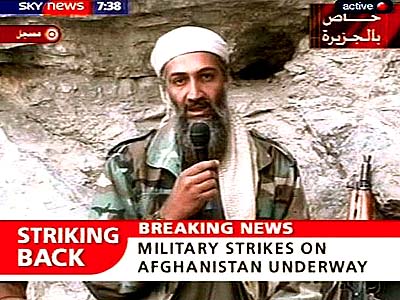
This is typical of the mixed signals we've been sending. Call it what you will, even humanitarian aid, and funnel it through the United Nations, but the effect is the same: to send to the Taliban a signal that its support of Bin Laden has been somehow acceptable.
From the beginning, over the last 20 years, our entire Afghan policy has provided a reminder of the dangers of "blowback," a phrase used to describe the turning of the machinations of U.S. intelligence agencies against our own nation. Yet, in the desperation of the moment, Congress now wants to empower the CIA to do more of the same.
Like the Taliban, Al Qaeda sprang from the "freedom fighters" recruited by the US to fight the Soviet-backed Afghan regime. From "First, Know the Enemy, Then Act" by Dale F. Eickelman. In the LA Times, 12/9/01:
Al Qaeda differs from other terrorist movements in selecting targets on a global rather than a regional or local scale and in using tactics that initially defied the imaginations of the most experienced counterterrorist specialists. Al Qaeda is also thoroughly modern, representing the dark side of globalization. Its membership transcends national boundaries, drawing from Muslim countries throughout the Middle East and South Asia. In a strange irony, the group's multinational makeup has its roots in the U.S.- and Saudi-approved recruitment of transnational Arab and other foreign fighters to the cause of expelling the Soviets from Afghanistan after they invaded in 1979. Al Qaeda, whose leadership includes many first drawn to Afghanistan in support of the anti-Soviet cause, has developed into a flexible multinational organization.
"Blowback" explained
An excerpt from "The Warnings Were on Page 1" by John Balzar. In the LA Times, 9/21/01:
If anyone is to blame for an intelligence failure, it is us, the stakeholders in our democracy. And, of course, those we elect to serve us.
But let's not be too harsh on ourselves right now. Instead, let's try to be constructive. Let's look at another failure—-a big failure—behind the mess we face in Afghanistan and the larger world of radical Islam. Maybe this will help explain why we so quickly turned our eyes from the obvious.
The failure was this: The U.S. had a lot to do with bringing this grief upon itself.
The CIA has a term for operations that go out of control: blowback. That's what happened in Afghanistan.
These angry radicals who have now declared war on the West emerged from a movement we financed and armed. Then it turned against us. Blowback. These holy warriors are the children of an American foreign policy that once before, as now, split the world into friend or foe. The Soviet Union was our Cold War adversary in the late 1970s. The enemy of our enemy is our friend, the U.S. decreed. Our friends, these anti-Soviet rebels, received about $500 million a year in U.S. support and weaponry.
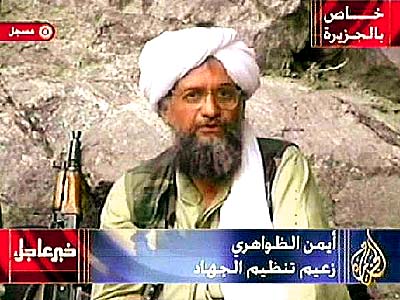
Then the blowback.
When the Soviets pulled out of Afghanistan in 1989, our interest in this woe-begotten country faded fast. The U.S. and Soviets left behind a wasteland of hatred, guns and impoverishment. The rebels set upon themselves, continuing the destruction of their country, fueled by anger and desperation, with no friends except their god. In that caldron the Taliban was born.
Our onetime proxies in this hot front of the Cold War, like Osama bin Laden, have now dispersed into the Balkans, into the Far East, throughout the Mideast, into Western Europe and even the U.S. They carry with them the training and the devotion we encouraged and perhaps even the Stinger antiaircraft missiles we provided them.
"We are creating our own monsters," a Russian diplomat told Dahlburg years ago. The State Department agreed. In the mid-1990s, it concluded that the Afghan war against the Soviet Union was the birthplace of the modern "transnational terrorist."
We cannot say we weren't warned. We can hope we'll be wiser now.
Comment: How typically American it is to do something immoral or ill-considered and then suffer "blowback." The US destroyed Native American cultures...so now Indians suffer poverty, alcoholism, and suicide rates well above the norm. The Founding Fathers wrote slavery into the Constitution...so the nation fought a bloody Civil War to end the institution it started. The European powers imposed the Treaty of Versailles on Germany...so Hitler led a World War to restore Aryan pride and dignity.
Clinton let Bin Laden metastasize
From the LA Times, 12/5/01:
Clinton Let Bin Laden Slip Away and Metastasize
Sudan offered up the terrorist and data on his network. The then-president and his advisors didn't respond.
By MANSOOR IJAZ
President Clinton and his national security team ignored several opportunities to capture Osama bin Laden and his terrorist associates, including one as late as last year.
I know because I negotiated more than one of the opportunities.
From 1996 to 1998, I opened unofficial channels between Sudan and the Clinton administration. I met with officials in both countries, including Clinton, U.S. National Security Advisor Samuel R. "Sandy" Berger and Sudan's president and intelligence chief. President Omar Hassan Ahmed Bashir, who wanted terrorism sanctions against Sudan lifted, offered the arrest and extradition of Bin Laden and detailed intelligence data about the global networks constructed by Egypt's Islamic Jihad, Iran's Hezbollah and the Palestinian Hamas.
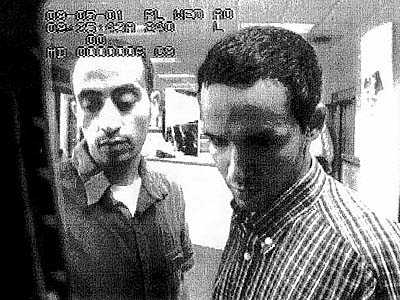
Among those in the networks were the two hijackers who piloted commercial airliners into the World Trade Center.
The silence of the Clinton administration in responding to these offers was deafening.
As an American Muslim and a political supporter of Clinton, I feel now, as I argued with Clinton and Berger then, that their counter-terrorism policies fueled the rise of Bin Laden from an ordinary man to a Hydra-like monster.
Realizing the growing problem with Bin Laden, Bashir sent key intelligence officials to the U.S. in February 1996.
The Sudanese offered to arrest Bin Laden and extradite him to Saudi Arabia or, barring that, to "baby-sit" him—monitoring all his activities and associates.
But Saudi officials didn't want their home-grown terrorist back where he might plot to overthrow them.
In May 1996, the Sudanese capitulated to U.S. pressure and asked Bin Laden to leave, despite their feeling that he could be monitored better in Sudan than elsewhere.
Bin Laden left for Afghanistan, taking with him Ayman Zawahiri, considered by the U.S. to be the chief planner of the Sept. 11 attacks; Mamdouh Mahmud Salim, who traveled frequently to Germany to obtain electronic equipment for Al Qaeda; Wadih El-Hage, Bin Laden's personal secretary and roving emissary, now serving a life sentence in the U.S. for his role in the 1998 U.S. embassy bombings in Tanzania and Kenya; and Fazul Abdullah Mohammed and Saif Adel, also accused of carrying out the embassy attacks.
Some of these men are now among the FBI's 22 most-wanted terrorists.
The two men who allegedly piloted the planes into the twin towers, Mohamed Atta and Marwan Al-Shehhi, prayed in the same Hamburg mosque as did Salim and Mamoun Darkazanli, a Syrian trader who managed Salim's bank accounts and whose assets are frozen.
Important data on each had been compiled by the Sudanese.
But U.S. authorities repeatedly turned the data away, first in February 1996; then again that August, when at my suggestion Sudan's religious ideologue, Hassan Turabi, wrote directly to Clinton; then again in April 1997, when I persuaded Bashir to invite the FBI to come to Sudan and view the data; and finally in February 1998, when Sudan's intelligence chief, Gutbi al-Mahdi, wrote directly to the FBI.
Gutbi had shown me some of Sudan's data during a three-hour meeting in Khartoum in October 1996. When I returned to Washington, I told Berger and his specialist for East Africa, Susan Rice, about the data available. They said they'd get back to me. They never did. Neither did they respond when Bashir made the offer directly. I believe they never had any intention to engage Muslim countries—ally or not. Radical Islam, for the administration, was a convenient national security threat.
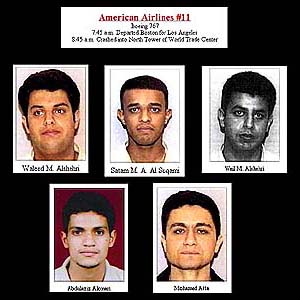
And that was not the end of it. In July 2000—three months before the deadly attack on the destroyer Cole in Yemen—I brought the White House another plausible offer to deal with Bin Laden, by then known to be involved in the embassy bombings. A senior counter-terrorism official from one of the United States' closest Arab allies—an ally whose name I am not free to divulge—approached me with the proposal after telling me he was fed up with the antics and arrogance of U.S. counter-terrorism officials.
The offer, which would have brought Bin Laden to the Arab country as the first step of an extradition process that would eventually deliver him to the U.S., required only that Clinton make a state visit there to personally request Bin Laden's extradition. But senior Clinton officials sabotaged the offer, letting it get caught up in internal politics within the ruling family—Clintonian diplomacy at its best.
Clinton's failure to grasp the opportunity to unravel increasingly organized extremists, coupled with Berger's assessments of their potential to directly threaten the U.S., represents one of the most serious foreign policy failures in American history.
*
Mansoor Ijaz, a member of the Council on Foreign Relations, is chairman of a New York-based investment company.
Copyright 2001 Los Angeles Times
Why the Soviets invaded Afghanistan
An excerpt from "Their Evilness Wasn't Outside History" by Alexander Cockburn. In the LA Times, 9/30/01:
Until now, America has led a charmed life amid its wars. The wars mostly didn't come home and the political culture of the U.S. ensured that the ordinary workers in the World Trade Center towers weren't really up to speed on what was wrought in freedom's name.
What about Afghanistan? In April 1978, an indigenous populist coup overthrew the government of Mohammed Daoud. The new government of Nur Mohammed Taraki embarked, albeit with a good deal of urban Marxist intellectual arrogance, on land reform; hence an attack on the opium-growing feudal estates. Taraki went to the United Nations, where he managed to raise loans for crop substitution for the poppy fields.
No matter how modern-minded Taraki might be or how feudal his enemies, in the summer of 1979, a U.S. State Department memo showed how the U.S. government viewed the stakes: "The United States' larger interests would be served by the demise of the Taraki-[Hafizullah] Amin regime, despite whatever setbacks this might mean for future social and economic reforms in Afghanistan. The overthrow of the [Democratic Republic of Afghanistan] would show the rest of the world, particularly the Third World, that the Soviets' view of the socialist course of history being inevitable is not accurate."
Taraki was killed by Afghan army officers in September 1979. Fearing a fundamentalist, U.S.-backed regime in Afghanistan, the Soviets invaded that December.
There's a lot of other relevant history that secretaries and messengers in the World Trade Center probably didn't know but that those men on the attack planes did. It would honor the memory of those who perished on Sept. 11 to insist that in the future, our policymakers and our press offer a better accounting of how U.S. wars for freedom are fought and what the actual price might include.
Sponsoring terrorism a US habit?
From filmmaker Michael Moore, 9/12/01:
...[A]ll day long I have heard everything about this bin Laden guy except this one fact — WE created the monster known as Osama bin Laden!
Where did he go to terrorist school? At the CIA!

Don't take my word for it — I saw a piece on MSNBC last year that laid it all out. When the Soviet Union occupied Afghanistan, the CIA trained him and his buddies in how to commits acts of terrorism against the Soviet forces. It worked! The Soviets turned and ran. Bin Laden was grateful for what we taught him and thought it might be fun to use those same techniques against us.
We abhor terrorism — unless we're the ones doing the terrorizing.
We paid and trained and armed a group of terrorists in Nicaragua in the 1980s who killed over 30,000 civilians. That was OUR work. You and me. Thirty thousand murdered civilians and who the hell even remembers!
We fund a lot of oppressive regimes that have killed a lot of innocent people, and we never let the human suffering THAT causes to interrupt our day one single bit.
We have orphaned so many children, tens of thousands around the world, with our taxpayer-funded terrorism (in Chile, in Vietnam, in Gaza, in Salvador) that I suppose we shouldn't be too surprised when those orphans grow up and are a little whacked in the head from the horror we have helped cause.
Yet, our recent domestic terrorism bombings have not been conducted by a guy from the desert but rather by our own citizens: a couple of ex-military guys who hated the federal government.
From the first minutes of today's events, I never heard that possibility suggested. Why is that?
Maybe it's because the A-rabs are much better foils. A key ingredient in getting Americans whipped into a frenzy against a new enemy is the all-important race card. It's much easier to get us to hate when the object of our hatred doesn't look like us.
Congressmen and Senators spent the day calling for more money for the military; one Senator on CNN even said he didn't want to hear any more talk about more money for education or health care — we should have only one priority: our self-defense.
Will we ever get to the point that we realize we will be more secure when the rest of the world isn't living in poverty so we can have nice running shoes?
In just 8 months, Bush gets the whole world back to hating us again. He withdraws from the Kyoto agreement, walks us out of the Durban conference on racism, insists on restarting the arms race — you name it, and Baby Bush has blown it all.
The Senators and Congressmen tonight broke out in a spontaneous version of "God Bless America." They're not a bad group of singers!
Yes, God, please do bless us.
Many families have been devastated tonight. This just is not right. They did not deserve to die. If someone did this to get back at Bush, then they did so by killing thousands of people who DID NOT VOTE for him! Boston, New York, DC, and the planes' destination of California — these were places that voted AGAINST Bush!
Why kill them? Why kill anyone? Such insanity…
Let's mourn, let's grieve, and when it's appropriate let's examine our contribution to the unsafe world we live in.

It doesn't have to be like this…
Yours,
Michael Moore
mmflint@aol.com
Comment: Why didn't anyone suggest that another right-wing nut like Tim McVeigh might be the terrorist? Why didn't anyone declare "war" on terrorism back when the murderers were white, Anglo-Saxon Protestants? Perhaps because the 9/11 massacre was much worse...or perhaps because we have a racist, xenophobic cowboy mentality. Perhaps because a home-grown killer is "a boy gone wrong" while a foreign killer is "evil incarnate."
As for singing "God Bless America," terrorists from right-wing militias to Islamic fundamentalists have sought God's blessings. Most terrorists invoke him to justify their massacres. That suggests how foolish it is to claim God on "our" side.
Looks to me like Allah and Mohammed are kicking the butts of God and Jesus, the "Greatest Warrior of Them All," so far. If Bush doesn't win his "war" against terrorism, I guess Jesus's new title will be Greatest Loser of Them All. If you believe Jesus is a good American, that is.
More on US support for terrorists
In view of the terrible terrorist attacks on New York and Washington, it is good to review some sinister aspects of our foreign policy. It is almost certain that Bin Laden has had his hand in these actions, and it is a fact that the Taliban rulers of Afghanistan have been providing him with a safe haven and facilities for training a large number of professional terrorists who inflicted many losses on America.
The same Taliban soldiers were trained and supplied with weapons by American agents under President Reagan; in fact, Reagan called them "freedom fighters." Just because someone is anti-Communist or anti-whomever we don't like, it is not a reason to support him. The enemy of our enemy is not necessarily our friend. This type of reasoning led to support of Hitler by German industrialists in the 1930s and to the elimination of democracy in Chile in more recent times, all in the name of anti-communism.
Marcel Gawartin, letter, LA Times, 9/23/01
Rather than preventing terrorist attacks against the U.S., the CIA incites them ("Rethink the CIA," editorial, Sept. 16). It trained Osama bin Laden. With its long history of murders, overthrown governments, election tampering and clandestine dealings with the worst of the torturers and brutes, the CIA has created 100,000 terrorists and sympathizers for every terrorist it has apprehended. Rethink the CIA, indeed: Abolish it.
Russ Jones, letter, LA Times, 9/23/01
Am I wrong to believe that after we support these people (Saddam Hussein, Bin Laden, etc.) they, in turn, attack us? What's going to happen with the individuals we train and arm closer to the States (drug wars in Central and South America)?
Brian T. Lynk, letter, LA Times, 9/23/01
Osama Bin Laden and Saddam Hussein: our two guys
Just as Ronald Reagan bolstered Osama Bin Laden's cause, he also bolstered Saddam Hussein's cause. Did Ronnie ever meet a dictator, thug, or terrorist he didn't like? If so, it isn't obvious. And how ironic is it that Donald Rumsfeld now reviles his negotiating partner Saddam?
From The Wraps Come Off Bush's Colonialist Agenda by Robert Scheer. In the LA Times, 3/25/03:
Lest we forget, Saddam Hussein and his Baath Party were the preferred choice of U.S. governments for most of the last 40 years. Even after Hussein gassed his own people, the 1988 signature horror to which Bush constantly refers, the U.S. government attempted to shift the blame to Iran and Bush's father extended to Iraq an additional $1.2 billion in credits and loans.
The Commerce Department under Ronald Reagan and George H.W. Bush had long permitted U.S. companies to sell anthrax and other biological and chemical supplies to Iraq, the Senate Banking Committee documented.
Furthermore, it was Reagan who signed National Security Decision Directive 114 on Nov. 26, 1983, committing the U.S. to do "whatever necessary and legal" for Iraq to win its war against Iran, even after documented reports of Iraq's use of what we now call weapons of mass destruction. It was at that time that Donald Rumsfeld was dispatched by Reagan as a special envoy to reassure Hussein of unwavering U.S. support.
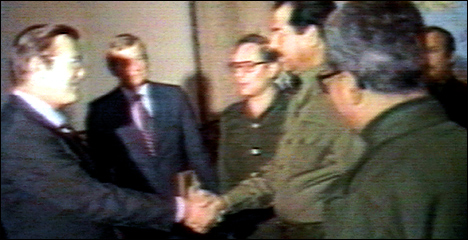
The scoop on Rummy's visit. From the LA Times, 9/15/02:
MIDDLE EAST
Why a War With Iraq Is Inevitable
By WILLIAM M. ARKIN
William M. Arkin is a military affairs analyst who writes regularly for Opinion. E-mail: warkin@igc.org
With war looming in Iraq, who is the only senior Bush official to have actually ever laid eyes on Saddam Hussein?
The answer—and the circumstances of the meeting—help explain why our two countries are destined for war, as they certainly are. You can hear it in the rhetoric of the countries' leaders.
"To assume this regime's good faith is to bet the lives of millions and the peace of the world in a reckless gamble," President Bush said before the United Nations General Assembly last week.
"The U.S. ... since its foundation was based on killing, usurping others' rights," Hussein said in a July meeting of the Iraqi Cabinet.
For all the wistful pleading for a resumption of inspections and diplomacy to avert war, the die has already been cast. There is nothing that the U.N. can do because there is nothing that Iraq will do that is acceptable to the U.S. The two nations don't just see things differently: It's as if they aren't seeing the same things at all.
Which brings us to Defense Secretary Donald H. Rumsfeld.
In 1983, obsessed with the hostages being held in Lebanon and with the fundamentalist government in Iran, President Reagan appointed Rumsfeld as a special envoy to the Middle East. U.S. intelligence believed Iran was behind the kidnappings (as well as the deaths of 241 Marines in Beirut when their barracks was blown up), and as part of his mission, Rumsfeld went to Baghdad to open high-level contact and seek Iraq's help in getting intelligence about Iran.
The carrot offered by the U.S.—which did not want Iran to win its war with Iraq—was a promise to begin efforts aimed at reducing the covert supplying of weapons and spare parts to Iran by Israel and others. The overt reward would be a reopening of diplomatic relations, which were severed by Iraq after the 1967 Six-Day War.
Rumsfeld took two trips to Iraq, and on the first one, in December 1983, had a rare visit with the Iraqi president. According to declassified State Department cables obtained by the National Security Archive in Washington, Rumsfeld and Hussein talked about a number of things. But, most intriguing to Iraq, Rumsfeld raised what all thought was a dead idea: building a secure, $1 billion oil pipeline from Iraq through Jordan to the Gulf of Aqaba.
Rumsfeld had every reason to think his trip had been successful. On Jan. 10, 1984, the U.S. interests section in Baghdad sent a cable to Rumsfeld and Washington saying that the Revolutionary Command Council had approved the pipeline project. "Tarik Aziz had gone out of his way to praise Rumsfeld as a person, noting that he was a good listener and had presented the U.S. position in a convincing manner," the cable reported. A follow-up cable Jan. 31 said that "the Iraqis will want U.S. firms heavily involved in the project," adding that the Iraqis were "directly in touch with a major U.S. construction company." (Later that year, the U.S. Export-Import Bank approved a $425-million loan guarantee to Iraq for building the pipeline, and in November, the U.S. Embassy in Baghdad was reopened.)
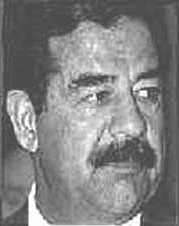
But it was soon apparent that the U.S. and Iraq saw the world through very different eyes. Rumsfeld was sent to Iraq not because the U.S. had suddenly decided that its regime was above reproach. In fact, just before his second trip, the State Department had accused Iraq of using proscribed chemical weapons in the Iran-Iraq war.
In Washington's view, Rumsfeld sat down with Hussein because it had been decided that the U.S. and Iraq had common interests—however limited. Although Baghdad had invaded Iran on Sept. 22, 1980, an Iranian victory was unacceptable to Washington. This meant the U.S. was willing to engage in covert efforts to get third countries to supply Iraq with weapons. In the year after Rumsfeld's visit, the CIA began to secretly supply Iraq with intelligence on Iran. That operation soon blossomed into a larger military exchange, one that continued until 1988 under a succession of code names: "Elephant Grass," "Druid Leader" and "Surf Fisher."
If there's one thing that defines Iraqis—and has proved their downfall in war crimes investigations—it is their compulsive record-keeping. They prepare transcripts of all important meetings, and they obsessively read and reread the transcripts looking for clues to the subtext of foreign interests.
According to State Department cables, the Iraqis, in poring over their transcripts of Rumsfeld's meetings during his two trips to Iraq, noted one thing above all others: his silence on the issue of chemical weapons, even though his second trip came soon after the U.S. had accused Iraq of using them in the war. In considering the meetings, the Iraqis also noted that while Rumsfeld named Iran, Syria and Libya as supporters of terrorism, he did not name Iraq. These things seemed highly significant to the Iraqis.
They further misread the U.S. position in 1988, when the Iraqis used massive amounts of chemical weapons in March in Halabja, against the Kurds, and then in April on the Fao peninsula, against the Iranian army. Though there was a ferocious internal discussion in the Pentagon about whether the U.S. should continue to provide assistance to a country that used such weapons, the cooperation continued to the end of the war, something the Iraqis read as tacit approval.
The U.S. never considered Iraq more than a partner of convenience—and then only for the limited purpose of tamping down Iran's power. But from the Iraqi perspective, the Americans' ongoing provision of intelligence information and willingness to work on a Jordan pipeline deal symbolized true U.S. interest in Iraq—even if that interest, as Iraqis believed, was largely financial.
Is it any wonder that Iraq, which had participated in the web of covert relations with the U.S., also misunderstood the U.S. in 1990 when the invasion of Kuwait was imminent?
More details on our complicity in Iraq. From How the US armed Saddam. In the Sunday Herald, 2/23/03:
The dossier claims 24 US firms sold Iraq weapons. Hewlett-Packard sold nuclear and rocket technology; Dupont sold nuclear technology, and Eastman Kodak sold rocket capabilities. The dossier also says some '50 subsidiaries of foreign enterprises conducted their arms business with Iraq from the US'. It claims the US ministries of defence, energy, trade and agriculture, and the Lawrence Livermore, Los Alamos and Sandia National Laboratories, supplied Iraq with WMD technology.
And from a letter to the LA Times, 10/31/02:
Pretend Monsters More Fun Than the Real Ones
We love to be frightened by cinematic creations such as Hannibal, Freddy and Jason. Unfortunately, we also have some quite real monsters floating around this year: Osama bin Laden and Saddam Hussein. Nobody appreciates the terror that these ghouls inspire. Let's see how we've created these monsters ourselves.
Franklin Roosevelt is supposed to have said of a petty dictator: "He may be an SOB, but at least he's our SOB." During the 1980s, we could have paid the same compliment to both Bin Laden and Hussein.
Saddam's criminal pathology was just fine as long as he vented it on Iran's Ayatollah Khomeini. And Bin Laden was A-OK when he was blowing up Soviet tanks and not American skyscrapers.
By funding and training homicidal dictators and dangerous fundamentalists, we have created our own SOBs. The trouble is that they're not our SOBs any longer.
Like Dr. Frankenstein's creation, our Middle Eastern monsters have turned against us with a vengeance. The good doctor learned the hard way that, when you play with dangerous forces, you and countless innocents can get badly hurt.
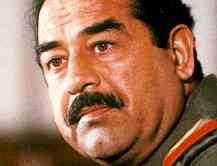
We have to stop creating our own monsters. How? Well, many of our Middle Eastern monsters are pretty oily characters. We need to overcome our addiction to foreign crude. In the short term, we need to responsibly exploit our own oil resources. In the long term, we need to develop alternative energies, such as wind and solar power. Hussein will never control the wind. Bin Laden can't turn off the sun.
Dr. Frankenstein wanted to control the forces of nature, and his arrogance unleashed a catastrophe, one that destroyed him. Let's learn from Frankenstein's experience by controlling our nation's appetites and ambitions. If we do, then the only monsters will be those on the movie screen.
STEVE MOZENA
Carson
Older roots of terrorism
From the LA Times, 10/21/01:
COMMENTARY
If the CIA Had Butted Out ...
By AHMED BOUZID
Ahmed Bouzid is president of Palestine Media Watch. Web site: www.pmwatch.org
Imagine if Aug. 19, 1953, had come and gone, uneventfully. Imagine if Operation Ajax, coordinated by the British MI6 and the American CIA, which toppled the flourishing democracy in Iran of Mohammed Mossadeq, had never left the drawing board. Imagine if the Western-educated Mossadeq, a charismatic leader who was massively backed in Iran by a burgeoning middle class, had been allowed to peacefully lead his country to become the first truly Muslim democracy in the Middle East. And imagine if his government had been allowed to assume its obligations and responsibilities, as stipulated by the 1906 constitution, and if the shah had been allowed to reign but not rule, as again stipulated by the Iranian constitution, and imagine if Britain and the U.S. had not been egged on by oil companies livid over Mossadeq's nationalization of oil interests in Iran but instead had stayed out of Iran's business and not intervened. Imagine what would have likely happened.
Had the coup never taken place, Iran probably would have gone on to build a sturdy, inclusive democracy that would have brought about a far more durable stability than what the shah—forever tainted in the eyes of his people as a weak, easily manipulated Western puppet—ever managed to deliver.
Had the coup never taken place, democratic Iran would have long ago done away with the myth that Islam and democracy are incompatible. More important, nationalist and anti-colonialist as it was, Iran would have handsomely served as the model to follow for the dozens of Arab and Muslim states that had recently gained, or were about to gain, independence from colonial occupation, thus averting their alignment with the Soviet bloc as well as the rise of homegrown thugs and dictators.
Had the coup never taken place, the ayatollahs, who had supported the coup against Mossadeq, would never have gained their political clout. Indeed, the shah saw in the conservative ayatollahs the perfect partners against the radicalism of the left and the liberalism of the middle class.
Had the coup never taken place and the ayatollahs never been given the political clout they had enjoyed under the shah, the June uprising of 1963, which was fueled by the clerics' unhappiness with the shah's attempts at modernization, would also have never taken place.
Hence no harsh crackdown would have followed the uprising, nor would have a little-known cleric, a certain Ayatollah Ruhollah Khomeini, gained international attention as the spiritual leader of that confrontation against the shah.
Had the coup never taken place, Khomeini would have remained a little-known cleric. Instead, he was exiled for 14 years, a time during which he cultivated his image from that of a charismatic leader to that of a sacred returning messiah. And during those 14 years, the prospect for the emergence of a truly democratic Iran grew dimmer while Islamic radicalism, associating all that is Western with the hated shah and his supporters—principally the U.S.—took a deeper hold on the passions of an increasingly frustrated younger generation.
Had the coup never taken place, there would not have been a hostage crisis, and neither would the U.S. have severed its relations with Iran and imposed economic sanctions. Both actions, more than 20 years later, remain in effect to this day.
Had the coup never taken place, Saddam Hussein would have never dared invade Iran in September 1980. The U.S. would never have sided with Iraq's dictator and neither would it have committed itself to a policy of ensuring that Iraq not lose the war. It would not have supplied Hussein with crucial assistance or turned a blind eye to his egregious crimes against his people.
Had the coup never taken place, Hussein would not have found himself by the end of the war against Iran as the commander of one of the largest armies in the Middle East.
More important, he would have never been under the impression that, as long as he restricted his aggression to fellow Muslims and kept off Israel, the world would only decry and condemn him but never act.
Had the coup never taken place, chances are that Iraq never would have invaded Kuwait, and the U.S. never would have had to orchestrate a massive military campaign against his army, let alone establish bases on Saudi soil. It would not have rendered talk about human rights and international law totally meaningless and hypocritical to Arab and Muslim ears.
Imagine a new era of foreign policy—an era in which international law is taken seriously, respected, in which sovereign democracies are encouraged, nurtured, applauded, rather than fought against, stifled and killed. Imagine if we abandoned, once and for all the poisonous doctrines of "Iron Chancellor" Bismarck and Henry Kissinger and instead subscribed to those of Amnesty International and Human Rights Watch. Imagine if we took the United Nations and The Hague seriously, rather than treating them as kangaroo courts in which only those causes championed by the mighty and powerful were pursued with vigor, while other grievances were neglected and scorned.
How many millions of lives would we have saved, and how much safer and more prosperous would the world be today?
Copyright 2001 Los Angeles Times
Related links
Terrorism: "good" vs. "evil"
America's exceptional values
Winning through nonviolence
America's cultural mindset
|
. . . |

|
All material © copyright its original owners, except where noted.
Original text and pictures © copyright 2007 by Robert Schmidt.
Copyrighted material is posted under the Fair Use provision of the Copyright Act,
which allows copying for nonprofit educational uses including criticism and commentary.
Comments sent to the publisher become the property of Blue Corn Comics
and may be used in other postings without permission.